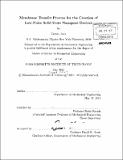Membrane transfer process for the creation of low-noise solid state nanopore devices
Author(s)
Jain, Tarun (Tarun Kumar)
DownloadFull printable version (7.614Mb)
Other Contributors
Massachusetts Institute of Technology. Dept. of Mechanical Engineering.
Advisor
Rohit Karnik.
Terms of use
Metadata
Show full item recordAbstract
Nanopore sensors are an emerging technology whereby the modulation of a current trace upon passage of the analyte through the nanopore is used to infer the properties of the analyte. This technology is particularly attractive because it is label-free, rapid, and intrinsically single molecule. However, the ability to infer molecular properties with nanometer precision, either in size or sequencing, is obscured by noise in the measurement. The precision of this inference can be significantly improved by reducing noise and by performing multiple measurements on the same molecule. Solid state nanopores, made in free standing membranes, however, have traditionally exhibited high levels of capacitive noise at 100 kHz bandwidths, as well as poor confinement of the electric field around the nanopore. In this thesis, a novel device concept is designed for creating solid state nanopores whereby the free standing membrane is transferred over a PDMS microchannel. By eliminating the silicon wafer backing, capacitive noise is dramatically reduced. Furthermore, the microchannel confines the electric field outside the nanopore, thereby enhancing the ability to perform multiple measurements.
Description
Thesis (S.M.)--Massachusetts Institute of Technology, Dept. of Mechanical Engineering, 2011. Cataloged from PDF version of thesis. Includes bibliographical references (p. 81-83).
Date issued
2011Department
Massachusetts Institute of Technology. Department of Mechanical EngineeringPublisher
Massachusetts Institute of Technology
Keywords
Mechanical Engineering.